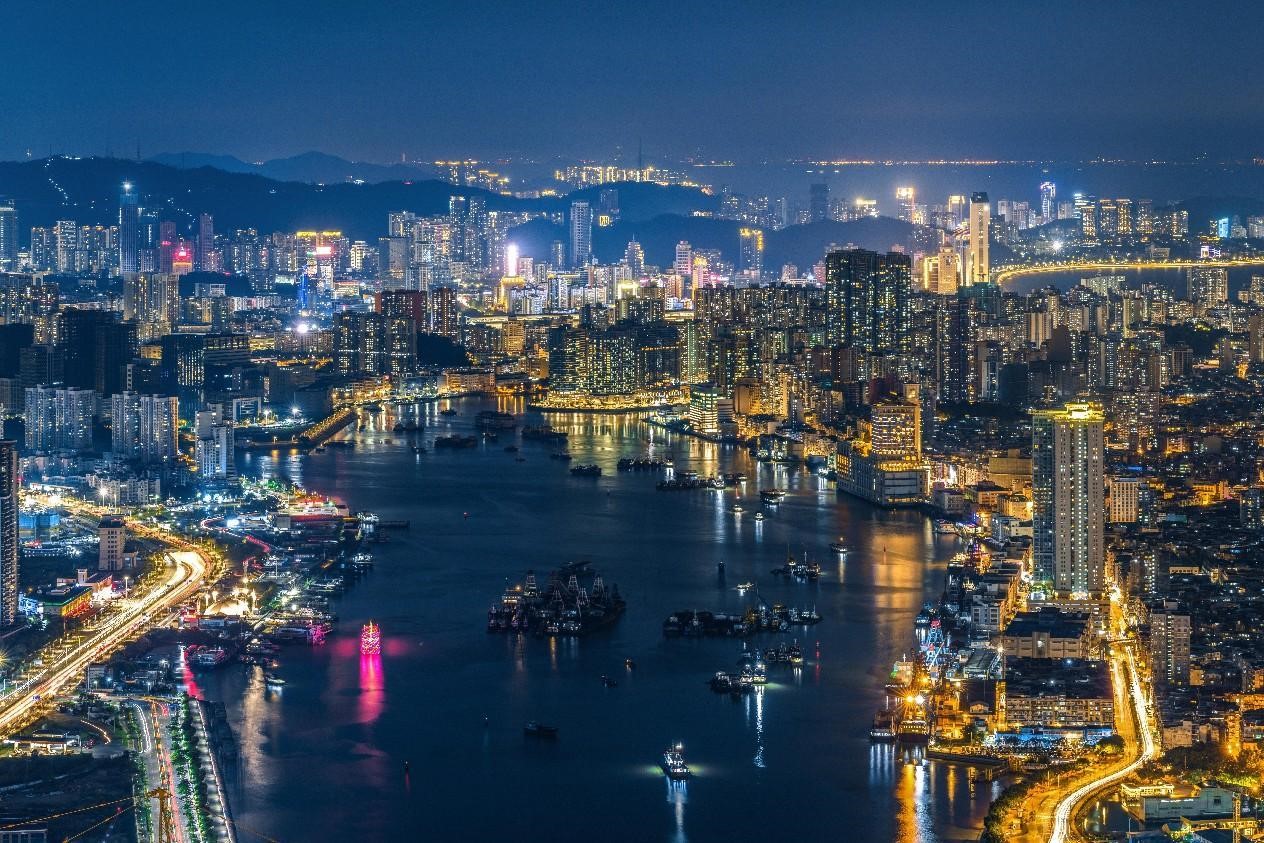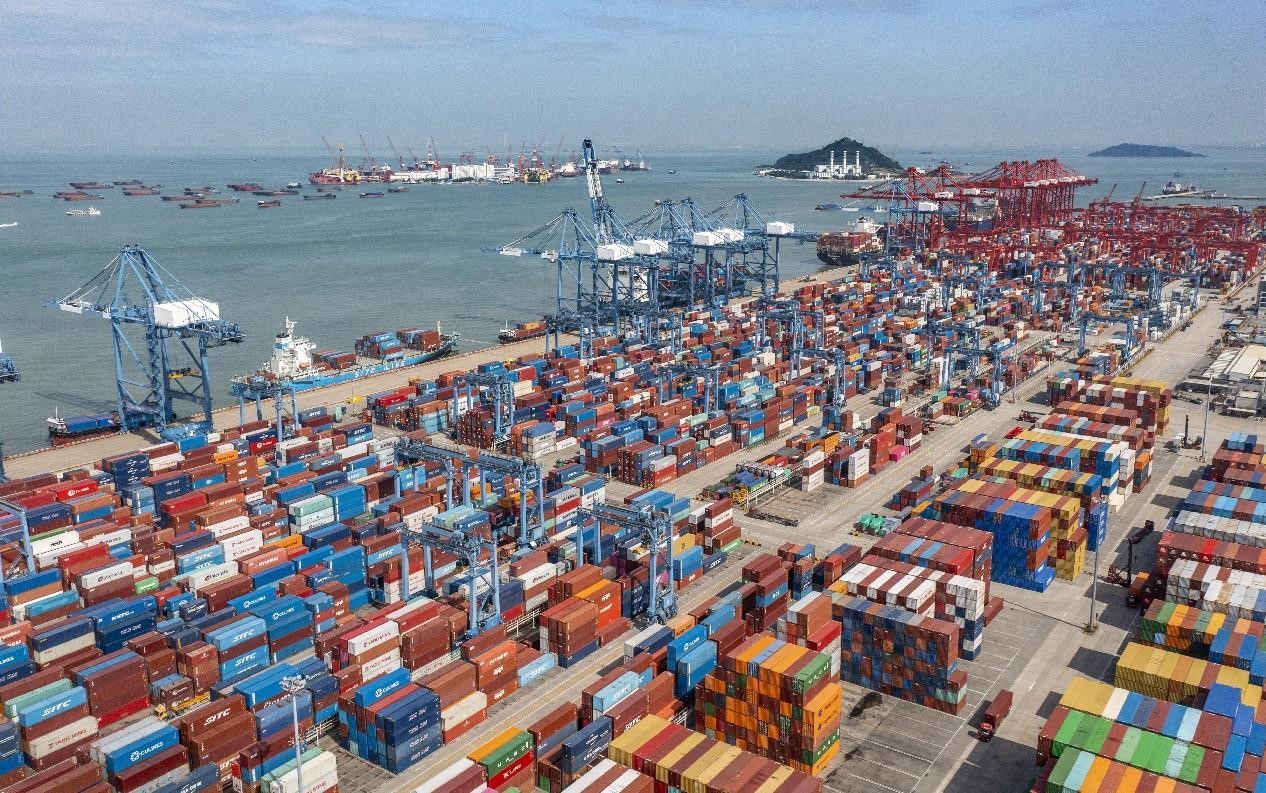
Photo shows a night view of the Qianshan River, which sets the border between Macao and Zhuhai, south China's Guangdong province. (Photo by Ding Junhao/People's Daily Online)
A series of policies have been rolled out and implemented since the Outline Development Plan for the Guangdong-Hong Kong-Macao Greater Bay Area (GBA) was released four years ago, deepening the synergetic development of rules and mechanisms in the three areas and taking the GBA into a new era of high-quality development.
Recently, the first national-level science park for future industries in the GBA was launched, which focuses on the development of frontier technologies such as electronic technology, biomedicine and futuristic automobiles.
Mainland cities in the GBA have started piloting a new policy of issuing endorsements for six categories of talents working in the mainland. Holders of the travel endorsement can travel to and from the Hong Kong Special Administrative Region (HKSAR) and Macao SAR unlimited times within the validity period.
Besides, Hengqin and Qianhai, two cooperation zones in Zhuhai and Shenzhen, two mainland cities in the GBA, have each released 30 measures to boost financial cooperation, which cover a wide range of aspects from financial market interconnection and promotion of cross-boundary trade to strengthening financial supervision.
Visions in the Outline Development Plan for the GBA have been turned into reality over the past four years.
Hong Kong is writing a new chapter of transiting from stability to prosperity and telling the world about new stories of its development. Macao is striving to develop an appropriately diversified economy and working to further speed up development. The nine mainland cities in the GBA reported total foreign trade of 7.94 trillion yuan ($1.15 trillion) last year, which accounted for 95.6 percent of Guangdong's total.
As of the end of 2022, the aggregated economic volume of the GBA neared 13 trillion yuan, increased by 3 trillion yuan since 2017. The number of permanent GBA residents exceeded 86 million, people's sense of gain, satisfaction and happiness has enriched..

Photo shows the Qianhai & Shekou Area of Shenzhen, China (Guangdong) Pilot Free Trade Zone in south China's Guangdong province. (Photo by Wang Meiyan/People's Daily Online)
As technologies, talents and industries in the GBA are seeing better and better integrated development, a world-class bay area that features infinite possibilities and huge vitality is taking shape.
Recently, Chief Executive of the HKSAR John Lee paid visits to multiple cities including Guangzhou, Shenzhen and Macao, during which he said the HKSAR will join hands with other GBA cities for closer cooperation in major sectors such as sci-tech development, finance, trade as well as culture and tourism.
Guangdong province has always been following the requests of the central government and doing its best to contribute to the GBA and meet the demand of the Hong Kong and Macao SARs.
With concerted and coordinated efforts, Guangdong, Hong Kong and Macao have taken solid steps toward building a world-class bay area and a world-class city cluster.
Over the past four years, the three areas have constantly promoted "hard connectivity" of infrastructure, "soft connectivity" of institutions and rules, as well as "heart-to-heart connectivity" among GBA residents, enhancing the appeal of the GBA.
A quality living circle with excellent public services for living, working and travelling is in the formation. The three areas of Guangdong, Hong Kong and Macao share similar cultures and enjoy strong social cohesion. The prospering development of key and core industries, vitality and good livelihood are new signatures of the GBA today.
A "one-hour transport circle" has been established in the GBA upon the opening of the Hong Kong-Zhuhai-Macao Bridge and the Hong Kong section of the Guangzhou-Shenzhen-Hong Kong Express Rail Link. The Shenzhen-Zhongshan Bridge, the Huangmaohai sea-crossing Bridge and the Shiziyang Channel will form a "golden corridor" in the GBA. Besides, a series of measures have been issued to facilitate Hong Kong and Macao residents living in the mainland in terms of living and employment.
Through promoting the complementarity and integrated development of industries, the GBA has comprehensively improved its international competitiveness. Hong Kong and Macao's advantages in modern finance and professional services, together with Guangdong's strong manufacturing sector and huge market are expected to produce a multiplying effect for the GBA and attract more and more transnational corporations and emerging tech firms to the megalopolis.

Photo shows the Mawan port in Shenzhen, south China's Guangdong province, the first 5G smart port in the Guangdong-Hong Kong-Macao Greater Bay Area. (Photo by Wang Meiyan/People's Daily Online)
At the end of 2022, the first Global Investment Promotion Conference for the GBA was jointly hosted by the governments of Guangdong, Hong Kong and Macao. A total of 853 cooperation projects were signed at the event, with total investment of 2.5 trillion yuan.
Multiple transnational corporations have chosen the GBA as an investment destination, including ExxonMobil, Siemens, AstraZeneca and Hyundai Motors, which indicates enterprises' confidence in the prosperity of the GBA.
At present, the GBA is home to 51 unicorn companies, or 1/6 of China's total and 1/20 of the world's total. It is one of the most important sci-tech innovation center around the world.
It is believed that as the mainland has fully resumed normal travel with the Hong Kong and Macao SARs, the exchanges of personnel, enterprises, organizations and government agencies in the GBA will become more frequent, and the construction of the GBA will hit a "fast lane" of stable development.





